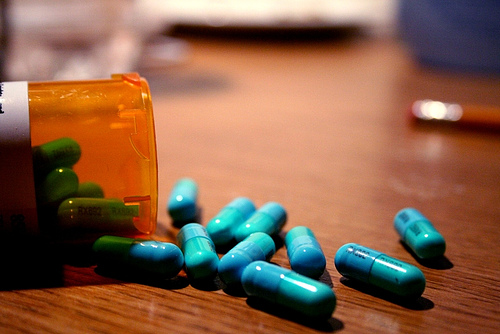
<a href="http://www.flickr.com/photos/fillmorephotography/259502894/">Michael Chen</a>/Flickr
In 2001, 18-year-old Ryan Haight ordered Vicodin without a valid prescription and had it delivered to his house. His subsequent overdose inspired Congress to enact the Internet Pharmacy Consumer Protection Act, aka the Ryan Haight Act. Designed to curb rogue online pharmaceutical companies, the act declared that no controlled substance shall be “delivered, distributed, or dispensed by means of the Internet without a valid prescription.” Additionally, doctors must conduct face-to-face examinations with patients, sites must post truthful information about their locations, and it is now a crime to use the Internet to advertise the illegal sale of controlled substances. Nationpharmacy.com, the website Ryan used to purchase Vicodin, was shut down. DEA Special Agent Gary Boggs told BuffaloNews, “The Ryan Haight Act has pretty much eliminated the online business in the United States.”
Turns out the DEA isn’t doing as good a job policing “rogue pharmaceutical sites” as it might feign. A study released this month (PDF) by LegitScript, an independent verification and monitoring service for online pharmacies, has identified and listed over 1,000 online pharmacies that are still selling prescription drugs without license and are in violation of the Ryan Haight Act. Below, three key factoids from the report.
1) How can you tell if a website is a “rogue pharmacy?”
According to the LegitScript report, only 28 sites have been verified by the National Association of Boards of Pharmacy. If the site doesn’t request a person-to-person interview and contains key phrases like “a physician…will review the information you have submitted” and “the order will be sent to a pharmacy where the prescription will be ‘filled and shipped,'” your BS alarms should be sounding off.
2) Aren’t most of these pharmacies from foreign sites?
Actually, they not. 55-75% of the illicit pharmacy websites sampled in the report are using US-based servers or Domain Name Registrars. Even if the pills come from foreign sources, funneling and distributing through US portals falls within the DEA’s jurisdiction. The DEA then has three primary options: seek a court order instructing these companies to discontinue services, ask them to voluntarily enforce their terms and agreements code, or freeze the domain name.
3) How are these pharmacies able to outsmart the DEA?
According to the report, the trick for these pharmaceuticals is to remain visible enough that customers can find them, but mask their operations from third parties like the DEA. Homepages may seem like they offer only prescription drugs, but website owners have portals that can unlock controlled substances for a buyer. Geo-targeting is another tactic designed to tiptoe around investigative eyes.
According to The Partnership for a DrugFree.org, 36 million Americans have bought medications online without a doctor’s prescription. Shutting down these “pill mills” and anonymous networks is an exercise in hydra head cutting: kill one and another rises in its place. So what’s next for enforcement? One option being considered is the Protect IP Act, a bill that devises new tools to stop the illegal distribution of drugs online.












